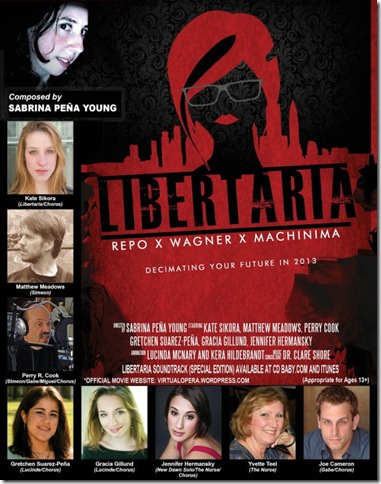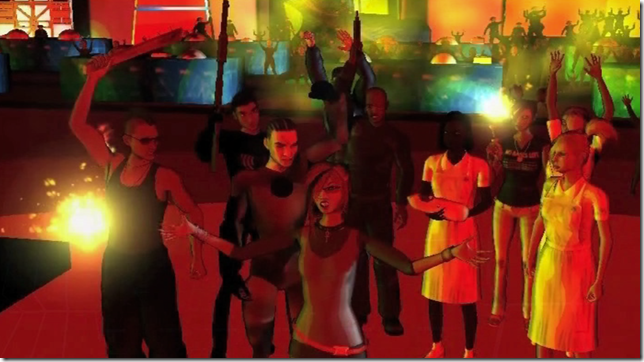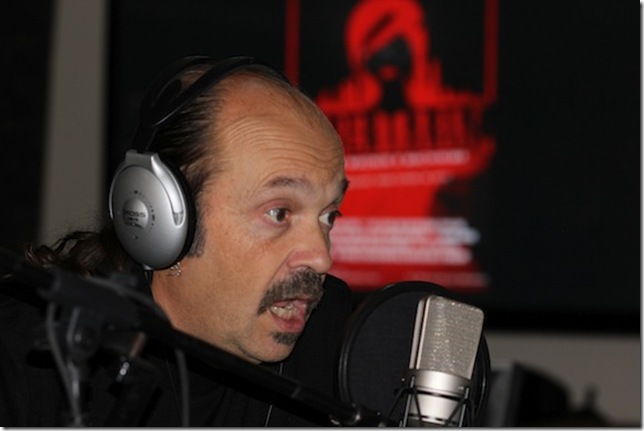If getting an established opera off the production ground is difficult and enormously expensive, it’s even tougher when the work is brand-new.
So what’s the aspiring Wagner of today to do? One answer, as Sabrina Peña Young will tell you, is to choose the early 21st-century default option and go online — to be Wagner 2.0, if you like.
Peña Young, a bubbly, intensely energetic native of South Florida, has created an animated “virtual opera” called Libertaria, a self-scripted sci-fi dystopia she cast entirely online, finding her singers through websites, Facebook and other Internet forums and having them send in vocal recordings of their parts. She’s never met most of the volunteer cast.
In addition to playing the music herself on an electronic keyboard, Peña Young also created about 75 percent of the animation for her hourlong work. Libertaria is probably the very first machinima opera, and its world premiere screening is set for Saturday afternoon at Calvary United Methodist Church in Lake Worth.
“If ‘Star Wars’ had taken place 100 years ago, it would have been an opera,” Peña Young said last month from her home in Buffalo, N.Y. “That’s what I’ve been trying to bring to people, that you can listen to this music, that you can enjoy this music, and it doesn’t have to be something where you’re sitting there saying, ‘This isn’t for me,’ or ‘This has no place today’ …
“It’s a way to bring opera to a wider audience, a younger audience, and then also a way to bring it online,” she said.
Libertaria is set in a post-apocalyptic United States in 2139, which has been devastated by a nuclear war that has ruined the environment and transformed the polity into warring factions. A castoff girl named Libertaria, abandoned in the Lady Liberty Souvenir Shop as an infant, has escaped the Factory (an evil place of test-tube human manufacture) and made her way to the territory of New Miami.
There she meets Simeon, an underground guardian of children who are being victimized by the masters of the Factory, an alliance known as the Collective. The seeds are sown for rebellion, which Libertaria is soon to lead.
Peña Young, who is currently finishing on a novel based on her script, said she could see something along these lines happening.
“Part of the reason I wrote the opera was to be a prophet: This is what could happen, but if we change things now, it probably won’t happen … It’s taken to the extreme-extreme-extreme, but on the other hand, the threads that run through it are threads of what’s going on now,” she said. “For instance, our government is supposed to be representative of the people, but if you ask anybody, they say, ‘What are they doing up there?’”
A child of Cuban and Dominican parents who grew up in Cooper City, Peña Young was drawn first as a musician to percussion.
“I wanted to be a famous rock drummer, as all little girls do,” she said.
But she found herself drawn to composition, and after high school, she studied at Palm Beach Atlantic University with composer Clare Shore, who organized Saturday’s premiere.
“She’s kind of been a mentor to me my whole life,” Peña Young said. “She said she’d really like to do it down here, and I said, ‘Why don’t we make that the premiere?’ … It’ll be a chance to go back home and show family and friends this big thing I’ve done.”
After a couple years at PBAU, Peña Young studied at the University of South Florida in Tampa and then Florida International University in Miami, where she earned her master’s degree in music technology. She has taught at FIU and Murray State University in Kentucky, and her music, which includes a multimedia oratorio called Creation, has been performed in such far-flung places as Beijing and Turkey, and closer to home at Milllikin University in Illinois and at the Art Basel festival in Miami Beach.
The urge to write an opera, and the realization of the obstacles involved, came to her two years ago as she and her husband, Nathan Young, were planning their move to Buffalo, where Young was taking a job as a strength coach for the football team at Buffalo State University. The Youngs have a daughter, Eva Rose, who turns 4 on Halloween.
“We were in the process of moving, and I realized I really wanted to write an opera, and as the wife of a coach, you end up moving around the country a good bit. I knew that if I wanted to do an opera, it’s a long, long process, and I wouldn’t be able to spend time doing it in one location and getting to work with an opera company. Plus, with the economy the way it is, wanting to do a grandiose opera costs a lot of money,” she said.
“So being a kind of techie nerd, I started looking into different ways to make an opera affordable and also accessible. I felt like a lot of times opera was just for people who like to sit very quietly, and only listen to Mozart, and who have this idea that it’s not for young people, or people of different cultures,” she said. “I really wanted to make an opera that was for a younger generation, and after it was finished, it could be posted online, and if you have a DVD, you can enjoy the opera and you don’t have to pay $100 for a ticket.”
Peña Young said she decided to go “all in” with the Internet in finding her cast, posting for singers on Facebook, posting calls with the International Alliance of Women in Music and writing an article for Sigma Alpha Iota, the fraternal organization for women in music. She also used the website MusicXray.com, an online A&R operation for which Peña Young has done some consulting.
“I set up an online audition on there, and that’s where I found Matthew Meadows, an indie rocker … he took on the role of Simeon, who is the male lead,” she said. Meadows, or more precisely Meadows’ voice, shares that role with Perry Cook, a professor emeritus of computer music at Princeton. Peña Young did the same kind of voice sharing with the role of Libertaria, which is sung by Kate Sikora and Gracia Gillund.
Cook said he got involved in the project while preparing a paper on augmenting choirs with technology.
“I was working on a paper/presentation on this topic, and got to the topic of ‘crowd-sourced’ choirs, and remembered that I’d been seeing Sabrina post about ‘Libertaria’ casting calls on Facebook,” Cook wrote in an email from his home in Oregon. “I had thought about auditioning, but forgot. I reached out to her to get an animation clip and get some information, and as we went back and forth, I asked her if she could tolerate another male voice in her cast. She enthusiastically said YEP, so I sent her some clips and we were off and running.”
Singers, who worked on a volunteer basis, rehearsed through Bandcamp.com, where Peña Young had uploaded cast rehearsal albums that contained scores, libretto excerpts and click tracks. Each singer was asked to do several versions of a raw .wav file that they then sent to Peña Young, who mixed and matched them to get the sound she wanted. Performers were required to have access to good recording equipment; some who wanted to participate in the project but couldn’t produce the right kind of files weren’t able to take part.
The cast also includes Jennifer Hermansky, an operatic soprano and graduate student at the University of Kansas; pop songwriter Joe Cameron; and actress-playwright Gretchen Suarez-Peña, who is Peña Young’s sister-in-law.
She ended up with about 1,000 tracks to be edited, and a boatload of animation, in which she was assisted by two other women, one of them an expert in lip-synching and another one who was “really good at explosions.” But most of it was done by Peña Young herself, using a British-developed program called Moviestorm.
 “Originally, I thought I had a core group of five or six animators who were going to work with me, but in the end, it ended up being just me and two other girls,” she said. “I ended up having to animate half the movie over the summer, which led to a lot of sleepless nights.”
“Originally, I thought I had a core group of five or six animators who were going to work with me, but in the end, it ended up being just me and two other girls,” she said. “I ended up having to animate half the movie over the summer, which led to a lot of sleepless nights.”
The music of Libertaria is an eclectic, accessible mix of styles, some of it more or less traditionally operatic, other parts closer to pop and Broadway. Fittingly for its subject matter, it has a rather dark tonal quality, though even the most somber moments of the score have prominent rhythms that propel the music forward.
“I think in terms of timbre, and sound, and speed, and volume and rhythm, and I don’t think so much in terms of harmony and traditional tonal theory,” she said. “I think that’s a lot of my percussion upbringing, and that’s why I like electroacoustic music so much. It’s such an integral part of my compositions.”
When she came to compose the music for Libertaria, she went on instinct, letting the text dictate what kind of music would be best for it, rather than her normal process of working with sketches and then trying to develop them. “What ended up happening to me with this opera … is as I wrote down the libretto, whatever (music) popped into my head as I wrote the text is what I wrote … Whatever was in my head, I just went with.”
One reason for that approach, she said, was to make sure the music never got too esoteric.
Cook wrote that he’s impressed by the results.
“It’s quite amazing. (It) has a wonderful anime/comic-book vibe to it,” he wrote. “Since all roles are shared between multiple human singers (partly due to the fact that characters age backward), It’s somewhat strange to hear my voice for a while, then Matt’s, then back to mine, then hear us (young and old Simeon) singing a duet with each other (me? us?).
“It’s pretty cool. The other singers are amazing. The chorus parts are epic. Quite an accomplishment,” Cook wrote.
The cast album of the music, which was released a few weeks ago, also benefited from the reach of the Internet. Peña Young funded the studio costs ($500) through a Kickstarter campaign.
Although the opera is finished in its movie form, Pena Young would like to see a live — or mostly live — version of it performed some day.
“I’ve already written acoustic versions of a couple of the songs, and what I would like to do is take ‘Libertaria’ and make it a live piece that combines the best elements of each. Some of my pieces in the past have involved live performers and multimedia,” she said, adding that while the popular Metropolitan Opera simulcasts of operas are exciting, they don’t have the same impact on film as they do live. “There’s just something about watching somebody breathing and hearing his voice come out of them, or seeing the timpanist strike the drum right in front of you, or watching the conductor move, and as the conductor moves, the orchestra just sways with him.”
Cook wrote that Peña Young’s opera is probably the beginning of more such works.
“I think we will likely see more and more machinima dramas, operas, etc. I wouldn’t be surprised to see an opera video game, or an opera within a video game,” he wrote. “The live singer component makes it hard, and cool, and time-intensive. But worth it.”
LIBERTARIA will screen at 3 p.m. Saturday at Calvary United Methodist Church in Lake Worth. Admission is free, with a $10 donation suggested. Call the church at 585-1786 or send an email to shoreclare@aol.com for more information.


